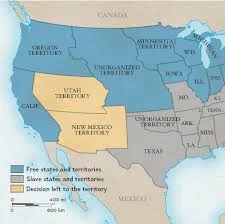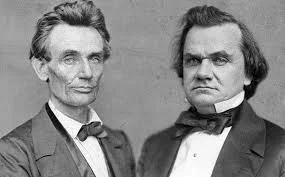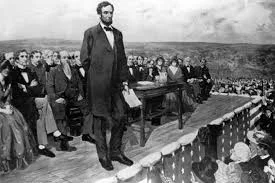-
 This compromise tried to keep peace between free and slave states. It allowed California to enter as a free state and created the Fugitive Slave Act, which forced people to return escaped slaves. How it led to war:
This compromise tried to keep peace between free and slave states. It allowed California to enter as a free state and created the Fugitive Slave Act, which forced people to return escaped slaves. How it led to war:
It angered Northerners who hated helping enforce slavery and made the divide between North and South even deeper. -
Pro-slavery and anti-slavery settlers rushed into Kansas, fighting bloody battles over whether it would become a free or slave state.
How it led to war:
The violence proved compromise was impossible and made both sides see each other as enemies. -
 This act, introduced by Senator Stephen Douglas, allowed settlers in Kansas and Nebraska to vote on slavery (popular sovereignty).
This act, introduced by Senator Stephen Douglas, allowed settlers in Kansas and Nebraska to vote on slavery (popular sovereignty).
How it led to war:
It repealed the Missouri Compromise’s ban on slavery north of 36°30′, sparking violent conflict and dividing the nation further. -
 Abraham Lincoln and Stephen Douglas debated slavery’s expansion during their Illinois Senate race.
Abraham Lincoln and Stephen Douglas debated slavery’s expansion during their Illinois Senate race.
How it led to war:
Lincoln’s strong moral stance against slavery made him a Northern hero and a Southern enemy. -
 After Senator Charles Sumner gave a speech attacking slavery, Representative Preston Brooks brutally beat him with a cane on the Senate floor.
After Senator Charles Sumner gave a speech attacking slavery, Representative Preston Brooks brutally beat him with a cane on the Senate floor.
How it led to war:
Southerners praised Brooks, Northerners were outraged, and it showed how violent and personal the slavery debate had become. -
 The Supreme Court ruled that Dred Scott, an enslaved man, was not a citizen and that Congress couldn’t ban slavery in the territories.
The Supreme Court ruled that Dred Scott, an enslaved man, was not a citizen and that Congress couldn’t ban slavery in the territories.
How it led to war:
This decision made slavery legal everywhere and outraged Northerners, destroying hopes for political compromise. -
 Abolitionist John Brown led a failed raid on the federal arsenal at Harpers Ferry, Virginia, to spark a slave revolt.
Abolitionist John Brown led a failed raid on the federal arsenal at Harpers Ferry, Virginia, to spark a slave revolt.
How it led to war:
Brown’s capture and execution made him a martyr in the North and terrified Southerners, convincing them war was coming. -
 Abraham Lincoln was elected president without carrying a single Southern state.
Abraham Lincoln was elected president without carrying a single Southern state.
How it led to war:
Southern states saw his victory as proof they had lost power in the Union, leading them to secede soon after.